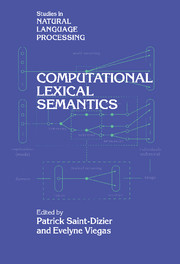Book contents
- Frontmatter
- Contents
- List of contributors
- Preface
- 1 An introduction to lexical semantics from a linguistic and a psycholinguistic perspective
- Part I Psycholinguistics for lexical semantics
- 2 Polysemy and related phenomena from a cognitive linguistic viewpoint
- 3 Mental lexicon and machine lexicon: Which properties are shared by machine and mental word representations? Which are not?
- Part II Foundational issues in lexical semantics
- Part III Lexical databases
- Part IV Lexical semantics and artificial intelligence
- Part V Applications
- Part VI Computer models for lexical semantics
- Author index
- Subject index
3 - Mental lexicon and machine lexicon: Which properties are shared by machine and mental word representations? Which are not?
Published online by Cambridge University Press: 29 September 2009
- Frontmatter
- Contents
- List of contributors
- Preface
- 1 An introduction to lexical semantics from a linguistic and a psycholinguistic perspective
- Part I Psycholinguistics for lexical semantics
- 2 Polysemy and related phenomena from a cognitive linguistic viewpoint
- 3 Mental lexicon and machine lexicon: Which properties are shared by machine and mental word representations? Which are not?
- Part II Foundational issues in lexical semantics
- Part III Lexical databases
- Part IV Lexical semantics and artificial intelligence
- Part V Applications
- Part VI Computer models for lexical semantics
- Author index
- Subject index
Summary
Language comprehension and interpretation can be set within a general cognitive science perspective that encompasses both human minds and intelligent machine systems. This comprehensive view, however, must necessarily entail the search for compatibility between various types of concepts or models subsuming classes of facts obtained through specific methods, and hence belonging to various scientific domains, from artificial intelligence to cognitive psychology, and ranging over linguistics, logics, neurosciences, and others.
No sub-domain of cognitive science is more fascinating for the exploration of such functional identities between artificial and natural processing or representation and none deserves more to be comparatively worked out than language comprehension or interpretation. The purpose of this chapter is to highlight some of these identities, but also some differences, in particular as concerns lexical semantics.
A large number of concepts are obviously shared by computational semantics and cognitive psychology. I will approach them in this chapter mainly in the form of relational properties, belonging to lexical-semantic, or lexical-conceptual, units, and will classify them according to whether they can be attributed, or not, to both mental and machine representations. For the sake of simplicity I will often restrict this comparison to consideration of lexical units that are expressed by nouns in most natural languages and which, as a rule, denote classes of objects or individuals. But other kinds of lexical-conceptual units, expressed in these natural languages by verbs, adjectivals, prepositions, function words, etc., and which denote events or actions, properties, various sorts of relations, etc., could also be submitted to this type of analysis and comparison.
- Type
- Chapter
- Information
- Computational Lexical Semantics , pp. 50 - 68Publisher: Cambridge University PressPrint publication year: 1995
- 1
- Cited by

